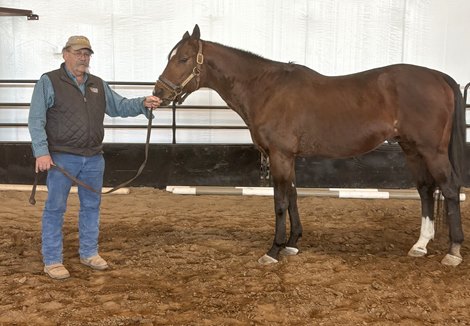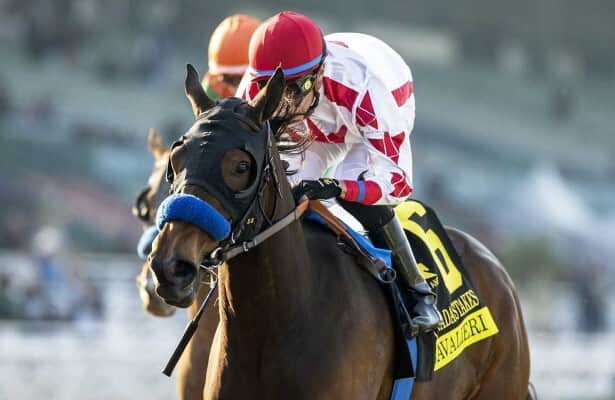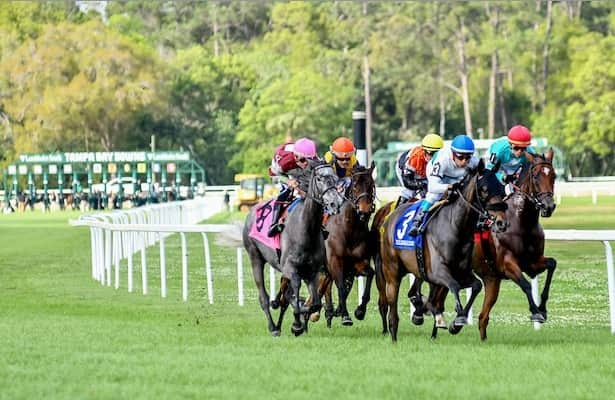Animal Science professor Dr. William “Bill” McGuire enjoyed a homecoming when he recently accepted a teaching position at Cloud County Community College in Concordia, Kan., the college where his teaching career began. The new job also included a reunion with Rascal Cat, a 20-year-old stallion who has been instrumental in helping McGuire teach animal science to college students around the Midwest and Northeast since 2017.
McGuire once owned a small farm outside of Concordia that he bought during his first term at Cloud County Community College where he had his own Thoroughbred breeding operation. He stood stallions, including Fistfite, who was the leading sire in Kansas for eight consecutive years in 2008-15.
In 2010, live racing in Kansas stopped because tracks there could not compete with other racing states offering richer purses bolstered by alternative gaming resources. As the Kansas breeding industry waned, McGuire had to look elsewhere for teaching jobs.
McGuire found an opportunity to start a Thoroughbred breeding program at Arkansas State University. His own stallion, Composer, had gone infertile due to old age so he began looking for a new stallion to assist him at ASU.
Fortuitously, McGuire heard from Murray Cluff, who had acquired Rascal Cat privately in 2014 as a stallion prospect.
Rascal Cat’s conformation and pedigree did offer potential. A son of Pulpit, he sold for $1.3 million to Stonestreet Stables out of Taylor Made Sales Agency’s consignment at the 2006 Keeneland September Yearling Sale. He is out of the winning Storm Cat mare Razzi Cat and is a half brother to group 1 winners Rocking Trick and Randy Cat. His family is rich in European success, with 35 stakes winners named under his third dam, Vale.
As a racehorse, however, Rascal Cat was hampered by a condylar fracture. Still, he raced until he was 9, winning 11 races and placing in 20 others out of 68 starts on his way to earning $203,124. He never won a black-type stakes, though he won the non-black-type 2013 Millarville Derby at Millarville Racetrack in Alberta, Canada, and placed in two other non-black-type stakes in 2014 while racing for Cluff.
Without black-type credentials, Rascal Cat had limited opportunities as a stallion when he entered stud in Alberta in 2015 and later while at J&M Reproduction Center in Oklahoma in 2017-18.
“Murray Cluff, is a big supporter of equine education, so he sent the stallion to me,” McGuire said. “Rascal Cat has a nice conformation and had sired winners from a limited number of offspring.”
Rascal Cat during his racing days
Rascal Cat has sired 35 foals of racing age to date that include 24 starters and nine winners. His gelded son Rascal Candy has five wins and has been in the money 17 times from 27 starts. He earned more than CA$65,600.
More importantly, Rascal Cat had the right temperament to be around students who were learning about live breeding.
“His temperament makes him perfect for a college stallion,” McGuire said. “He knows he’s a stallion and will remind you of it but is not overly aggressive or mean in any manner. I’ve been around stallions most all of my life, and he is perfect for teaching students about stallion handling and breeding.”
McGuire was at ASU for a couple of years and then took a job as assistant manager at Sequel Stallions in New York. Shortly after he left, without a champion for the breeding program, ASU phased out its breeding program. McGuire eventually returned to teaching at Cazenovia College in Cazenovia, N.Y. When Cluff learned that McGuire had returned to academia, he sent him Rascal Cat.
The Covid-19 pandemic short-circuited McGuire’s time at Cazenovia, which never saw its enrollment return from pre-pandemic levels and the nearly 200-year-old college was forced to close.
When one door closes, another opens.
Last year, the Kansas Legislature authorized historical horse racing electronic games with the hopes of revitalizing the state’s Thoroughbred racing and breeding industries.
“With recent legislation providing 3% of the revenue from historic horse racing for purses and breeders awards, Kansas racing and breeding is set to make a comeback,” McGuire said. “Rascal Cat had shipped home to Canada after Cazenovia College closed, and with the news of racing returning to Kansas, Murray shipped Rascal Cat to me at Cloud County Community College. It truly was like seeing an old friend when he walked off the trailer.”












